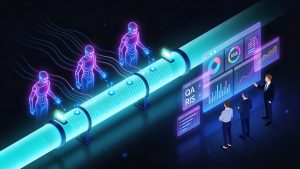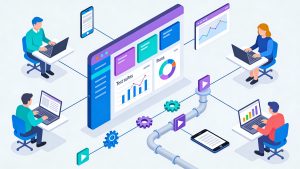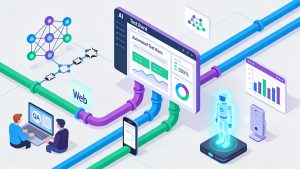Regression testing is a vital process for ensuring that new code changes in software applications do not introduce bugs or issues into existing functionality. As software scales, however, traditional regression testing methods can become increasingly time-consuming and resource-intensive. Utilizing AI in regression testing helps organizations mitigate these challenges by optimizing test selection, automating test generation and execution, and enhancing the overall defect detection process.
What is AI in Regression Testing?
AI in regression testing involves the use of artificial intelligence tools and techniques to automate and enhance the entire regression testing process. While traditional manual regression testing is heavily dependent on human effort, AI offers intelligent test automation and data-driven insights to increase the effectiveness and efficiency of the regression test process.
AI-powered regression testing tools can dynamically adapt to changes in test scripts and prioritize test cases. These tools can also predict areas that are likely to be most affected by new updates. By analyzing defect patterns, user behavior, and historical data, AI helps identify risk-prone areas and ensures thorough testing of critical functionalities.
Challenges with Traditional Regression Testing
Traditional regression testing ensures that new changes do not break existing functionality, but it presents significant challenges. As software scales, maintaining an efficient and effective regression testing process can become increasingly difficult.
Key challenges associated with traditional regression testing include:
- Time-Consuming Test Execution: Running various test cases to verify specific functionalities after each update is tedious and time-consuming, especially as the test suite grows.
- Inefficient Test Selection: Executing all test cases after every code change is inefficient, making it increasingly complex to determine which ones to run.
- High Maintenance Burden: As software evolves, test suites require continuous updates and additions to remain relevant, adding to the maintenance burden.
- Monotonous Manual Work: Manually performing regression testing is repetitive and monotonous, leading to a decline in attention and motivation among testers.
To overcome these limitations, it is important to leverage AI-powered testing solutions that introduce automation, intelligence, and efficiency into the process.
Why Use AI in Regression Testing?
AI enhances regression testing by making it faster, smarter, and more efficient. The benefits of using AI in regression testing include:
- Improved Test Coverage: AI testing tools analyze usage patterns, user behavior, and historical data to identify gaps in current test suites, helping QA teams thoroughly test critical workflows and edge cases. AI can improve existing test cases or suggest new ones.
- Accelerated Test Cycle: Incorporating AI tools in regression testing speeds up the entire testing cycle with features that automatically generate test cases and tests.
- Reduced Test Maintenance: AI automatically adapts test scripts to address issues arising from changes in the existing codebase. For example, if locators for UI elements change, AI tools with “self-healing” features reduce the need for manual script updates. This minimizes maintenance effort and prevents test failures due to minor changes.
- Enhanced Defect Detection: AI leverages machine learning algorithms to recognize anomalies and predict areas of software applications that are prone to failure, enhancing the overall defect detection process. It analyzes historical data on defects, identifying risk-prone areas and prioritizing them for testing. Additionally, AI can detect patterns that are too subtle for humans to notice.
Use Cases of AI in Regression Testing
To understand how organizations can make the most of AI in regression testing, it is important to recognize the various use cases where AI plays a specific role.
- Test Case and Test Script Generation: AI analyzes user behavior and automatically creates regression test cases, covering edge cases. It also generates test scripts using different programming languages and frameworks.
- Test Data Generation: AI generates synthetic or real-world test data to improve test coverage for regression scenarios.
- Test Prioritization and Optimization: AI identifies critical regression test cases based on code changes, past failures, and risk analysis. It optimizes test execution by prioritizing high-risk tests and running them in parallel.
- Self-Healing and Test Maintenance: AI self-heals test scripts by updating locators and test steps when the UI changes. Self-healing test automation also helps generate and maintain robust test scripts for regression testing.
- Defect Detection and Reporting: AI provides insights into test failures, trends, and defect predictions for regression cycles. It also detects UI differences across versions to prevent unintended design changes. Cloud-based testing platforms such as LambdaTest offer features like SmartUI, an AI-native test execution platform that allows for visual UI testing across different desktop and mobile environments.
AI Tools for Regression Testing
Several AI testing tools can enhance the automated regression test process:
- KaneAI: KaneAI, by LambdaTest, is a GenAI native testing agent designed for high-speed quality engineering teams. It enables the creation, management, and debugging of regression tests using natural language, simplifying the testing process and reducing the need for extensive coding expertise. It supports multi-language code export, converting automated tests into various programming languages and frameworks.
- ACCELQ: ACCELQ is an AI-powered codeless automation testing platform for designing, automating, executing, and tracking regression test suites. This unified platform can validate application layers with regression-level maturity for microservices testing.
- Testim: Testim facilitates automated regression testing by verifying that software applications do not regress to a previous state. The platform leverages machine learning to adapt and stabilize the testing process automatically.
- Katalon Studio: Katalon Studio is a powerful AI-based regression testing tool that ensures scalability, improves productivity, and enables low-code practices. It supports regression tests on various browsers, devices, and operating systems, using Appium and Selenium as its open-source test automation frameworks.
- Avo Assure: Avo Assure is a comprehensive AI-powered regression testing tool that uses various manual and automated testing methods to enable teams to identify and resolve bugs in their applications. As a no-code automation testing solution, Avo Assure caters to non-technical users and offers advanced analytics and reporting features.
Future of AI in Regression Testing
AI in regression testing is expected to become more autonomous, handling nearly every stage of testing, from test generation to execution and result analysis, with minimal human intervention. Future advancements in test optimization will enhance efficiency by clustering and sequencing test cases based on dependencies, execution history, and impact, maximizing coverage with minimal resources.
AI-based autonomous testing agents are poised to emerge, capable of generating test cases and scripts. These innovations will redefine regression testing, making it more adaptive, intelligent, and efficient.
Conclusion
AI is transforming regression testing by addressing the inefficiencies of traditional methods. From optimizing test execution and reducing maintenance overhead to enabling predictive defect detection, AI enhances speed, accuracy, and efficiency. GenAI native test agents streamline the process by intelligently prioritizing test cases, automating maintenance, and minimizing redundant test execution. As AI continues to evolve, it will drive autonomous test generation, adaptive learning, and explainable decision-making, making regression testing more efficient and reliable.
Read more such articles from our Newsletter here.



